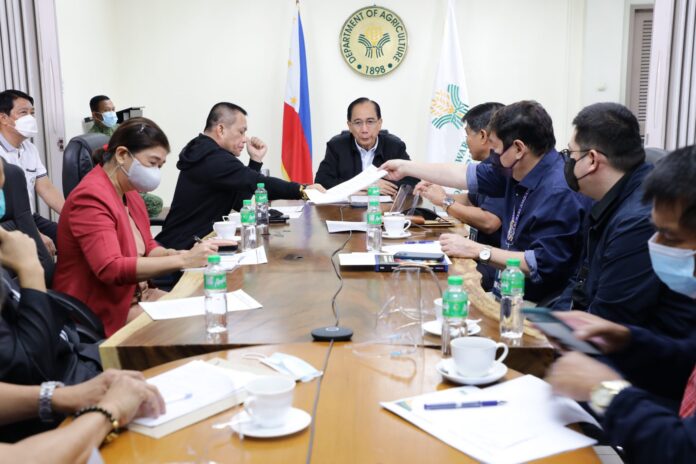
-
The Department of Agriculture and Bureau of Customs will conduct stricter inspection of imported fresh and frozen agri-fishery cargoes
-
The agencies will create a technical working group to review 15-year-old guidelines on handling imported food items
-
After undergoing an “open-close” examination at the “first border” or port of entry, all fresh and frozen agri-fishery cargoes will now be subjected to stricter 100% inspection upon arrival at the designated warehouses or “second border”
-
The 100% inspection at second borders is temporary pending completion of first border facilities to be constructed by the DA at major ports
-
Subic will be the first site of the first border facility to be called Commodity Examination Facility for Agriculture
The Department of Agriculture (DA) and Bureau of Customs (BOC) agreed to implement a new set of measures curtailing the entry of smuggled agricultural commodities.
Agriculture Secretary William Dar and Customs Commissioner Rey Leonardo Guerrero on October 8 agreed to strengthen “second border” inspections and create a technical working group (TWG) to review the 15-year-old guidelines and procedures on handling imported food items.
“Our goal is to curb the entry of smuggled agri-fishery products, while ensuring consumer safety in accordance with the provisions of Republic Act (RA) No. 10611 or the ‘Food Safety Act of 2013’ and other applicable laws,” Dar said in a statement.
To do this, the two agencies will implement an intensified and stricter second border inspection and control procedures to ensure all imported agricultural commodities are monitored for food safety.
The inspection will include investigation of misdeclared goods, and violators will be penalized accordingly.
Dar said all fresh and frozen agri-fishery cargoes will continue to undergo an “open-close” examination at the “first border” or port of entry, but will now be subjected to a stricter 100% inspection once they arrive at the designated warehouses or “second border.”
He added, “This measure will only be temporary pending the completion of the first border facilities that will be constructed by the DA at major ports, starting in Subic, called as commodity examination facility for agriculture (CEFA).”
DA and the Subic Bay Metropolitan Authority (SBMA) last June agreed in principle to establish the country’s first CEFA at the Subic Bay Freeport Zone in Zambales. Earlier, DA said it plans to put up CEFAs, previously also referred to as agricultural commodity examination areas, at the Manila International Container Terminal, Manila South Harbor, Cebu, Batangas, Subic, and Davao.
READ: PH’s first cold exam facility for agri, fishery imports eyed in Subic
Further, DA and BOC agreed to create a TWG to review and strengthen guidelines and protocols.
The TWG—chaired by DA assistant secretary for regulations Liza Battad and co-chaired by DA assistant secretary for economic intelligence Federico Laciste, BOC-Intelligence Group deputy commissioner Raniel Ramiro, and BOC assistant commissioner Vincent Phillip Maronilla—will help establish sanitary and phytosanitary measures, food safety standards, and other regulatory measures in conducting first/second border inspection and control procedures.
TWG members include the respective heads of DA regulatory agencies, like the bureaus of plant industry, animal industry, and fisheries and aquatic resources, and National Meat Inspection Service, as well as concerned BOC officers.
DA noted that Section 12 of the Food Safety Act states: “Imported foods shall undergo cargo inspection and clearance procedures by the DA and the DOH at the first port of entry to determine compliance with national regulations. This inspection by the DA and the DOH shall always take place prior to assessment for tariff and other charges by the BOC.”
Further, BOC has committed to provide the concerned DA attached agency with the inward foreign manifest and bill of lading of all agri-fishery shipments to enable it to identify shipments requiring food safety inspection.
“This will also allow us to cross-check our records and identify the shipper and recipient of the cargoes containing agri-fishery products,” Dar said.
“We can verify with the BOC, in real-time, the correctness of all the documents from the importers, including the details of all the food items and the owners of the cargoes,” he added.
READ: DA orders stricter first border checks on agri-fishery imports
Prior to the agreement with BOC, Dar last May signed Memorandum Order No. 30, ordering all DA-attached agencies and bureaus to strictly implement established sanitary and phytosanitary measures, food safety standards, and other regulatory measures under their regulatory powers and jurisdiction when conducting first border inspection and control.




